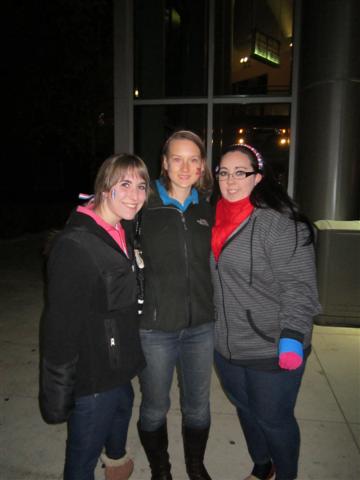
Tara Sennick spent the summer and fall semester working for the Romney Campaign. The junior politics major began volunteering for the campaign in June of this year, and was hired as a part-time staffer in October. In addition to campaign duties, Sennick continued to take a full course load of classes throughout the semester.
As a paid staffer, Sennick was accountable for voter identification in the lower Hillsboro area. This essentially meant that she researched who supported Governor Romney in this section of the Granite State. In addition, Sennick completed 14 book walks per week, assembled volunteers throughout New England to assist with the campaign efforts, and worked at various campaign events throughout New Hampshire.
On average, Sennick typically set aside six days per week to work for the campaign. Her entire weekends, from 9 AM to 9 PM each day, were spent at the Victory Office in Nashua. Even on Fridays, Sennick headed to the Nashua office immediately after her classes ended. She would remain here until 9 PM, only to return bright and early the following morning.
Throughout the remainder of the week, Sennick would work remotely from her on-campus dorm, making phone calls to New Hampshire residents. These calls were one of the ways in which the campaign gathered voter information and conducted surveys.
Since Sennick was still enrolled in five classes, her Thursdays were dedicated to completing all of the assignments for the following week. After all, this was the only free time she had throughout her entire week.
” As the election drew closer, my hours became longer. The four days leading up to the election, I spent every waking moment working. In those four days, I spent maybe eight hours sleeping and often times it was wherever I could find time, like sleeping in the car on the way to a lit drop or signing location,” says Sennick.
While working on the campaign, Sennick focused on discussing Mitt Romney’s plan for fixing the economy.
“I would emphasize Governor Romney’s five point plan for a stronger middle class, which included energy independence, providing a better education so that students have the necessary skills, a trade policy that works for America, cutting the deficit, and championing small business.”
Even though the economy was one of the major points this election season, Sennick explained that it was very difficult to convince college students to vote for Romney. For this particular demographic, social issues seem to take precedence over other issues such as the economy, the unemployment rate, the deficit, and healthcare.
In addition to all of Sennick’s efforts, many other College Republicans volunteered for the Romney campaign on weekends. These volunteers, according to Sennick, helped out in any and every way possible.
“One SAC student, Kendra Schnip, even started a Students For Romney Club on campus to help spread the word about Governor Romney, find volunteers, and let students know about how they could attend campaign events.”
With all of the help from volunteers and staffers, Sennick believes that the Romney Campaign was an overall success. In fact, more doors were knocked and phone calls made than during the McCain Campaign back in 2008.
After all of the time and energy placed into the campaign, Tuesday’s election results were shocking to the members involved in the Romney Campaign.
“It was a tough defeat on Tuesday. Many of us had spent a lot of time working to get Governor Romney elected, and seeing the results was disappointing. I personally never expected that so many people would register to vote on Election Day,” comments Sennick.
On Election Day, hundreds of voters registered to vote at each polling location, most of whom voted for Obama.
“It was this turnout for same day registration that shocked me the most, and I believe this is the reason President Obama ended up winning the state of New Hampshire,” says Sennick.
Nevertheless, despite Tuesday’s turnout, Sennick was grateful for this wonderful opportunity.

